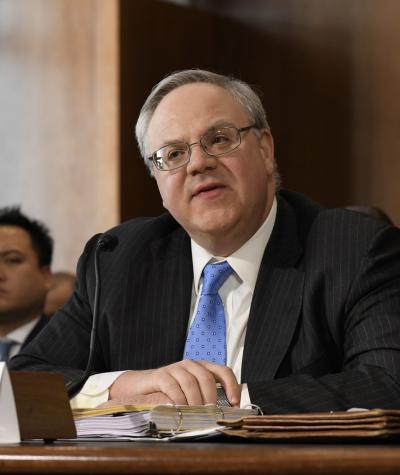For those who hoped the departure of secretary Ryan Zinke signaled an end to the Department of the Interior’s (DOI) disregard for ethics rules, the nomination of acting secretary David Bernhardt to head Interior shows no cause for optimism, according to an op-ed in Morning Consult today. The piece, co-authored by CLC’s Delaney Marsco and Brendan Fischer, highlights Bernhardt’s conflicts of interest in regulating the same big oil, gas, and agricultural interests for which he once lobbied.
As the Senate prepares to vote on Bernhardt’s confirmation Thursday, the DOI Inspector General is reviewing allegations of Bernhardt’s ethical impropriety as deputy secretary under Zinke, after CLC flagged these issues in a February complaint filed with the agency. Among Bernhardt’s long list of potential conflicts, his relationship with Westlands Water District stands out as a prime illustration of his ethical issues. Westlands, a company with federal contracts to provide water to California’s powerful agricultural interests, has a long history with Bernhardt, who is now tasked with regulating the company.
Westlands has paid millions to lawyers and lobbyists – including Bernhardt – to minimize environmental protections for endangered species. When Westlands sued to challenge the endangered species protections, it was Bernhardt who argued for the company before a federal court. When Westlands and its apparent front group, the Center for Environmental Science, Accuracy & Reliability (CESAR), sought to curtail environmental regulations, Bernhardt served on CESAR’s board. When Congress enacted a law that maximized the diversion of water to Westlands, Bernhardt lobbied for the bill.
Under the Trump administration’s ethics pledge, appointed officials agree to recuse from particular matters they lobbied on in the prior two years. Bernhardt, however, continued to advocate for Westlands’ interests after he joined Interior. According to the op-ed, “he used his official authority to institutionalize those same provisions he lobbied on.”
But Bernhardt’s issues don’t stop there. Westlands is just one of 26 of Bernhardt’s former lobbying clients who create a potential for conflicts of interest. Roughly 20 have business before Interior.
Ethics rules are vital to ensure that public officials make decisions on behalf of the people, not special interests to which the official has financial ties. Before Bernhardt’s committee vote, Senators should consider whether Bernhardt has adequately addressed concerns about whether Interior is fully committed to the public interest in protecting increasingly scarce natural resources for generations to come.

